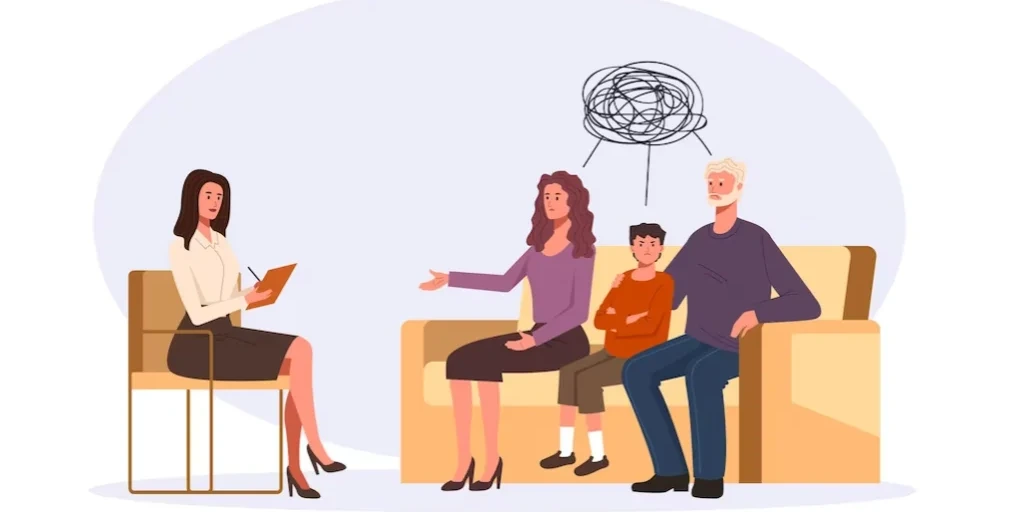24/7 Helpline:
(866) 899-111424/7 Helpline:
(866) 899-1114
Learn more about Bipolar Disorder Treatment centers in Lexington

Other Insurance Options

Group Health Incorporated

Absolute Total Care

Aetna

Kaiser Permanente

United Health Care

Sliding scale payment assistance

Excellus

MHNNet Behavioral Health

Access to Recovery (ATR) Voucher

Humana

Holman Group
Beacon

Medical Mutual of Ohio

Optima

Private insurance

UnitedHealth Group

Highmark

GEHA

Premera

Health Net


St. Anthony Recovery and Treatment – Lee Avenue
St. Anthony Recovery and Treatment - Lee Avenue offers behavioral health services for adults, childr...

Landmark Recovery of Oklahoma City
Landmark Recovery is a private rehab located in Oklahoma City, Oklahoma. Landmark Recovery specializ...

Into Action Sober Living
Into Action Sober Living is a sober living rehab center for men in Oklahoma City, OK. It offers a su...

City Rescue Mission – Bridge to Life
City Rescue Mission, located in Oklahoma City, Oklahoma, provides direct services to men and women s...

The Recovery Center
The Recovery Center is located in Oklahoma City, Oklahoma. The Recovery Center is a not-for-profit t...

Mission Treatment
Mission Treatment is a drug and alcohol rehab located in Oklahoma City, Oklahoma. They provide outpa...

Turning Point South
Turning Point South is a non-profit rehab located in Oklahoma City, Oklahoma. Turning Point South sp...

A Chance to Change
A Chance to Change is an outpatient counseling center located in Oklahoma City, OK. A Chance to Chan...

Open Options
Open Options is a private rehab located in Oklahoma City, Oklahoma. Open Options specializes in the ...

Oklahoma County Interventions
Oklahoma County Interventions is a public rehab located in Oklahoma City, Oklahoma. Oklahoma County ...

Care for Change
Care for Change is a private rehab located in Oklahoma City, Oklahoma. Care for Change specializes i...

Valley Hope
Valley Hope - Northwest 63rd Street offers outpatient treatment for individuals with alcohol and/or ...

St. Anthony Recovery and Treatment – 59th Street
St. Anthony Recovery and Treatment - 59th Street is located in Oklahoma City. St. Anthony Recovery a...

Aurora Counseling Services
Aurora Counseling Services is an outpatient treatment facility that provides substance abuse and men...

The Harbor
The Harbor is a drug and alcohol addiction rehab located in Oklahoma City. Harbor also provides effe...

Red Rock Behavioral Health Services – 4400 North Lincoln Boulevard
Red Rock Behavioral Health Services – 4400 North Lincoln Boulevard is a private rehab located in Okl...

Red Rock Behavioral Health Services – North Lincoln Boulevard
Red Rock Behavioral Health Services – North Lincoln Boulevard provides mental health and substance u...

Total Life Counseling
Total Life Counseling is a drug and alcohol rehab located in Oklahoma City, OK. They provide outpati...

Affinity Counseling Services
Affinity Counseling Services is a private rehab located in Oklahoma City, Oklahoma. Affinity Counsel...

Cope
Cope is a private rehab located in Oklahoma City, Oklahoma. Cope specializes in the treatment of alc...

New Day Recovery – Family Services
New Day Recovery – Family Services is a private rehab located in Oklahoma City, Oklahoma. New Day Re...

Reach for the Light Enrichment Center
Reach for the Light Enrichment Center is a private rehab located in Oklahoma City, Oklahoma. Reach f...

The Salvation Army Adult Rehabilitation Center
The Salvation Army Adult Rehabilitation Center is a private rehab located in Oklahoma City, Oklahoma...

NorthCare
NorthCare is a reputable dual diagnosis mental health and addiction treatment center located in Okla...

Rehabcare Group Baptist Village
Alano Club is a drug and alcohol rehab and recovery resource organization located in Portland, OR. T...

Specialized Outpatient Services
Specialized Outpatient Services (SOS) was founded in Feburary 2000 with a mission to help those suff...

Justin’s Lighthouse
Justin's Lighthouse is a faith-based residential program for alcoholics and addicts who have failed ...

Life Recovery Services
Life Recovery Services is an outpatient substance use, mental health, and gambling treatment facilit...

Your Key to Change
Your Key to Change is located in Oklahoma City, Oklahoma. Your Key to Change offers outpatient treat...

South OKC Rightway Medical
South OKC Rightway Medical is a private rehab located in Oklahoma City, Oklahoma. South OKC Rightway...

Firstep Women’s Recovery Program
Firstep Women’s Recovery Program is a non-profit rehab located in Oklahoma City, Oklahoma. Firstep W...

Latino Community Development Agency – LCDA
Latino Community Development Agency (LCDA) is located in Oklahoma City, Oklahoma. Latino Community D...

Able Recovery
Able Recovery is an outpatient addiction treatment center that can be found in Oklahoma City, Oklaho...

INTEGRIS Mental Health and Addiction Recovery Programs
INTEGRIS Mental Health Clinic provides behavioral health treatment in an outpatient manner for child...






























Alcohol Training and Education
Alcohol Training and Education - North Portland Avenue offers outpatient treatment for individuals w...

Rightway Medical
Rightway Medical is a private rehab located in Oklahoma City, Oklahoma. Rightway Medical specializes...

New Beginnings Counseling Services
New Beginnings Counseling Services is a private rehab located in Oklahoma City, OK. New Beginnings C...

Catalyst Behavioral Services
Catalyst Behavioral Services is located in Oklahoma City, Oklahoma. Catalyst Behavioral Services pro...

Pathways Professional Counseling
Pathways Professional Counseling is a private rehab located in Oklahoma City, Oklahoma. Pathways Pro...

Cornerstone Counseling
Cornerstone Counseling is a private rehab located in Oklahoma City, Oklahoma. Cornerstone Counseling...

Concepts Integrated Behavioral Health
Concepts Integrated Behavioral Health is an outpatient facility that offers treatment for individual...

Valley Hope of Oklahoma City
Conveniently located off Broadway Extension and Hefner Road, Valley Hope of Oklahoma City provides i...

YouthCare of Oklahoma
YouthCare of Oklahoma is an outpatient clinic that provides mental health and substance use treatmen...

Catalyst Behavioral Services – Community House
Catalyst Behavioral Services – Community House is a private rehab located in Oklahoma City, Oklahoma...

Rose Rock Academy
Rose Rock Academy is a private rehab located in Oklahoma City, Oklahoma. Rose Rock Academy specializ...

Southern Plains Treatment Services
Southern Plains Treatment Services is a public rehab located in Oklahoma City, Oklahoma. Southern Pl...

Family Development Interventions
Family Development Interventions is a private rehab located in Oklahoma City, Oklahoma. Family Devel...

New Alternatives Center
New Alternatives Center is a private rehab located in Oklahoma City, Oklahoma. New Alternatives Cent...

Maximus Counseling
Maximus Counseling is a private rehab located in Oklahoma City, Oklahoma. Maximus Counseling special...

Mercy Clinic Behavioral Health
Mercy Clinic Behavioral Health is located in Oklahoma City, Oklahoma. Mercy Clinic Behavioral Health...

Southern OK Treatment Services
Southern OK Treatment Services is a private rehab located in Oklahoma City, Oklahoma. Southern OK Tr...

OKC Metro Alliance – FIRSTEP Men’s Recovery Program
OKC Metro Alliance- FIRSTSTEP Men’s Recovery Program, located in Oklahoma City, Oklahoma, is a sober...

Oxford House Grove
Oxford House Grove is a democratically self-run residence in Oklahoma City, Oklahoma. Oxford House h...

Anderson and Associates Counseling
Anderson and Associates Counseling is a private rehab located in Oklahoma City, Oklahoma. Anderson a...

Powerhouse
Powerhouse is a private rehab located in Oklahoma City, Oklahoma. Powerhouse specializes in the trea...

Al – Anon
Al – Anon is a private rehab located in Oklahoma City, Oklahoma. Al – Anon specializes in the treatm...

Addiction Solutions
Addiction Solutions is a private rehab located in Oklahoma City, Oklahoma. Addiction Solutions speci...

Red Rock Behavioral Health Services – Jordans Crossing
Red Rock Behavioral Health Services – Jordans Crossing is a public rehab located in Oklahoma City, O...

Love and Tolerance Group of AA
Love and Tolerance Group of AA is a private rehab located in Oklahoma City, Oklahoma. Love and Toler...

Eagle Ridge Institute
Eagle Ridge Institute is located in Oklahoma City, Oklahoma. Eagle Ridge Institute offers Substance ...











